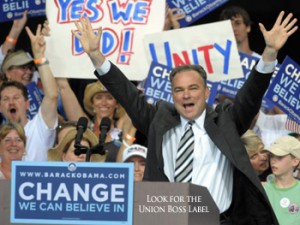Will Team Biden Weaponize Workers’ Pensions?
Big Labor abuse of worker pension and benefit funds as a means of advancing union bosses’ self-aggrandizing policy objectives is a familiar phenomenon.
Virginia is a battleground state for the presidency and for control of the US Senate this year. Former GOP Senator and Right to Work champion George Allen is running against former Obama’s handpicked Democratic National Committee Chairman and while Virginia governor and Tim Kaine. Kaine claims to support the state’s Right to Work law, but does not support a national Right to Work law.
The Richmond Times Dispatch noticed how President Obama in a speech deriding Right to Work called Tim Kaine a “friend of labor.” “Friend of labor” is a euphemism for “friends of the union bosses.” American workers who have ‘friends’ like these, who needs enemies:
In a recent speech calling Tim Kaine a “friend of labor,” President Barack Obama took a swipe at states — including Virginia — that have right-to-work laws. Not surprisingly, he misrepresented not only the laws but the facts.
The president says right-to-work laws are an attempt to “take collective bargaining rights away.” No, they aren’t. Unions can still bargain collectively in right-to-work states. What they can’t do is make union membership a condition of employment.
The president also said he likes to call right-to-work “right-to-work-for-less laws.” Good one. But studies about wages in right-to-work versus non-right-to-work states differ; some say they’re higher, others say they’re lower. And others note that both economic output and wages have risen faster in right-to-work states.
What’s more, last year PolitiFact looked into Fox host Bill O’Reilly’s claim that unemployment is lower in right-to-work states. The fact-checkers noted that while the difference is not great, and while one could argue about causation, the claim was “mostly true.” They went on to note that “none of the economists we spoke to thought the gap was especially surprising, either now or historically.”
So here’s a wager: We bet that nine out of 10 people would prefer to have work that might or might not pay slightly less, than to live in a state where wages might or might not be higher — but have no work at all.

Big Labor abuse of worker pension and benefit funds as a means of advancing union bosses’ self-aggrandizing policy objectives is a familiar phenomenon.

What impact does handing a union monopoly power to deal with your employer on matters concerning your pay, benefits, and work rules have on your pay?

Wherever Big Labor wields the power to collect forced union dues, union bosses funnel a large share of the confiscated money into efforts to elect and reelect business-bashing politicians. Employment growth tends to lag as a consequence.